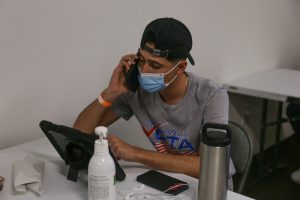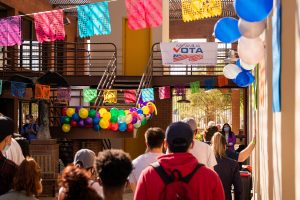- Slug: BC-CNS Latino Voter Turnout, 1,330 words.
- 2 photos and captions below.
By Daja E. Henry
Cronkite News
PHOENIX – Latino voters fueled by the Trump administration’s failures to curb COVID-19 and the lingering impact of the anti-immigration law known as SB 1070 helped turn Arizona blue after decades of entrenched Republican rule, according to organizers who have spent years working toward this moment.
“This feels like a victory lap,” said Eduardo Sainz, director of Mi Familia Vota in Arizona. He spoke hours before Wednesday’s early returns showed that Democrat Joe Biden had won Arizona. Democrats celebrated a second Senate seat, and they should hold a majority of the state’s congressional seats, according to unofficial early returns.
Attention in the 2020 election cycle was riveted on Latino voters, who now make up the largest minority ethnic voting bloc in the country. In Arizona, nearly 1 out of 4 eligible voters are Latino, according to the Pew Research Center.
The Biden campaign hoped to capture 70% of those voters in its bid to flip a state that hasn’t voted for a Democratic presidential candidate since Bill Clinton in 1996. According to an early poll by American Election Eve, Biden reached that number.
Sainz, 27, said the victory in Arizona is a long time coming.
“This feels like looking at all of the hard work we’ve been able to do over the past 15 years, looking at real change, looking at real power, looking at our communities holding the keys to the White House,” he said.
Still, activists and other experts caution against the mistaken assumption that Latinos are a huge, unified group that leans to the left politically.
“What we have seen time and again is that our communities are treated as a monolith. And there’s so many cultural nuances, racial differences, ethnic differences,” said Alejandra Gomez, co-executive director of the advocacy group LUCHA.
Martha Figueroa, 46, exemplifies those nuances.
When she voted Tuesday in Laveen, a neighborhood in the southwest corner of Phoenix, she recalled a trope that President Donald Trump famously wields – and then voted for him in spite of it.
“Latinos, we are not rapists and we are not criminals,” said Figueroa, who this year changed her voting registration from Democrat to Republican.
“We need to make a better America and Biden is not the one to lead us. Whoever is here from another country, let’s get them papers, and whoever wants to come needs to come legally. We need to know who is here.”
In Florida, about 55% of the Cuban Latino voting bloc voted to reelect Trump, according to NBC News’ exit polls.
Trump and Biden came to Arizona, a state that shares a border with Mexico, intent on courting Latino voters, but it was Biden who triumphed.
In Nevada, where Latino voters make up 20% of the electorate, the presidential race remains too close to call, but their role is crucial. In 2016, Hillary Clinton won Nevada by just 2 percentage points.
Hector Sanchez Barba, chief executive of Mi Familia Vota, called it irresponsible to assume that Latinos vote as one bloc that shows up at the polls.
“This is the first question the media asks me: ‘When is the sleeping giant going to wake up?’” Sanchez Barba said. “Which is extremely denigrating and lacks the basic understanding of how to work in our democracy – that a democracy that is extremely imperfect – and doesn’t really understand how hard it is for a community to participate in the process.”
In Arizona and other parts of the country, some observers said, COVID-19 – which has disproportionately affected people of color – bent the Latino vote toward Biden.
Polling from American Election Eve and phone banking by Mi Familia Vota suggest the ongoing pandemic was the most important election issue for Latinos. The Centers for Disease Control and Prevention said Latino communities in Arizona were some of the hardest-hit by COVID-19.
But the foundation for the 2020 election flip was likely SB 1070, a decade-old Arizona law that upended immigration policies and drew international attention as one of the toughest anti-immigration laws in the country.
As a teenager, Sainz was galvanized by SB 1070, known as the “Show me your papers law,” which gave law enforcement the legal right to stop people they suspected of being in the country illegally and, as the ACLU and others charged, led to rampant racial profiling. Though the law is still on the books, it has been stripped of some of its controversial parts.
During that time, activists also launched a campaign to oust Maricopa County Sheriff Joe Arpaio, who, in 24 years in office, targeted undocumented immigrants and created what he called his own “concentration camp” to house them.
“I literally was able to see how people were so terrorized, that they packed everything that they own into vehicles and travel back to Mexico or to other states, et cetera,” Sainz said. “And looking at their fear … was something that I knew, I didn’t want communities and other individuals to go through.”
Gomez of LUCHA also was involved in the protests against Arpaio. She said she found herself at a vigil at the Arizona Capitol with just seven people in 2010. But it eventually drew thousands and lasted 103 days.
Yara Marin, 24, is the political director for Mi Familia Vota. Before she was able to vote, she was canvassing and phone banking during the fight against SB 1070. She continues that tradition of activism in Mi Familia Vota’s office.
This time around, the presidential election was just as crucial.
“Everything was on the ballot,” Marin said. “The people you vote for are going to decide whether or not you have access to high quality, affordable health care, whether or not our teachers and our students get good textbooks and good education, small classes. There is so much on the ballot that’s really going to define rights for everyone.”
To make that happen, advocates said they had to fight attempts at voter suppression and intimidation. Mi Familia Vota and advocates nationwide noted a series of robocalls targeting Latinos nationwide, with messages in both English and Spanish claiming that the polls would be open the day after the election, or declaring that a candidate had already won.
That is where groups like LUCHA and Mi Familia Vota step in, Gomez said.
“Communities at the margins are left with the challenges of voter suppression, the challenges of misinformation, and also accessibility for our communities while juggling the pandemic, job loss, childcare, homeschooling,” she said. “Our communities are trying to figure out how to survive, let alone how to find their polling location.”
The final push to get out the vote came Tuesday, Election Day. Many of the people working the get-out-the vote phone bank were teenagers. Kevin Rosas, 16, said he got involved because he had a lot of family members working with Mi Familia Vota. Felix Cordova, also 16, said he took the job for pay but quickly realized the value of the impact he could make.
According to Marin, Mi Familia Vota registered nearly 15,000 new voters this cycle, and then an additional 35,000 after a lawsuit to extend Arizona’s voter registration deadline. The group made more than 27,000 phone calls. LUCHA said its volunteers knocked on 54,000 doors and made more than 8 million phone calls.
That level of investment, Sanchez Barba said, is what the political parties increasingly targeting Latino voters have been missing. Mi Familia Vota operates in six states, but the chief executive chose to spend the final hours of Election Day in Arizona.
“Looking at political power, and not the transactional one that historically we have seen in the Latino community, politicians come in and out to us last minute to do the work, just for turnout for that particular election,” he said. “But Arizona is showing that we can do it better.”
Still, advocates said, there’s more work to do. Sainz and Marin pointed out health care and education as key issues they’re pushing to reform.
“We continue to organize,” Sainz said. “We’re never going to stop.”
Cronkite News reporter Anthony J. Wallace contributed to this article.
For more stories from Cronkite News, visit cronkitenews.azpbs.org.
^_=

